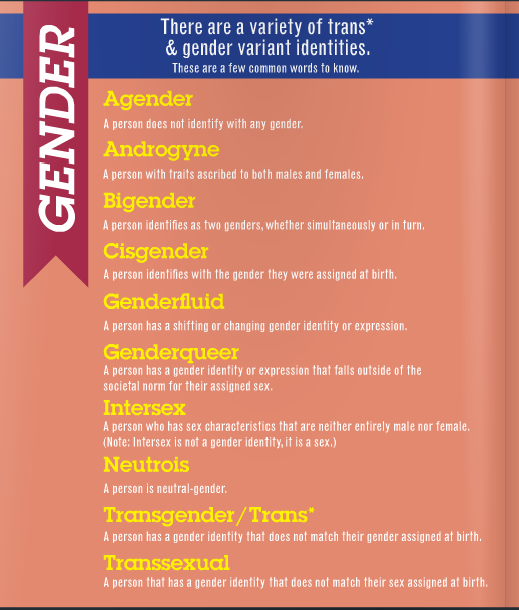Advertisement
His? Her? They? Understanding The Latest Gender Identity Language
We took a close look at transgender issues last week through the eyes of one teenager and his family. We heard from many readers who wanted to know more about the way teenagers and 20-somethings think about gender. Of course, not all younger people are rethinking gender and not all the people rethinking gender are young, but there is something happening that wasn't when I graduated from college in 1984. So, if you want to learn more, here's one personal story: It's written by Alex, a Smith College undergrad who uses the pronoun "they." Alex identifies as gender queer, but is not out to family members, so we've agreed not to use Alex's last name.
--Martha Bebinger

The name my parents gave me means 'grace.' It never quite fit me, my clumsiness manifest in the tables I bump into, the ink smears in my writing, the awkwardness with which I try to reclaim and adjust to a body that has never felt like it belonged to me. This body, short and thick, with a uterus that is incapable of regulating itself without additional hormones and breasts too large to hide, is a body that marks me, irrefutably in most people’s eyes, as ‘female,’ or ‘woman.’ Even when I cover up, wear tight sports bras and loose sweaters, I get called ‘girl’ or ‘she,’ and it makes the pit in my stomach tighten. But at the same time, the few times I have been called ‘sir,’ I haven’t felt any better, and I have no desire to become instantly recognizable to the general public as male, no sense that testosterone-fueled facial hair or having my breasts removed would make me feel more at home. Neither extreme fits the person I know I am.
Most people see gender as a binary — male/female — with no or little wiggle room. However, I have always seen it more as a spectrum, with masculinity at one end and femininity at the other and lots of murky grey space in-between. I occupy this grey space, this unknowingness, this refusal to fit into one prescribed box. I happen to belong somewhere between neutral and masculine, flitting between men’s clothes and women’s depending on how much I want my body to be on display. I am most at home in women’s jeans and a men’s sweater.
After years searching for a term that felt like home, I came across one — transmasculine genderqueer. It is clunky, offering little clarity, but it is the one I feel best describes me. I feel more comfortable with masculinity than with femininity, but that does not mean that I want to be a man. I have toyed with other terms over the past few years, most notably ‘butch,’ but that still implies a womanhood, however masculine, that does not sit right with me.
The other part of ‘genderqueer’ that appeals to me is its potentially active, and activist, nature. In much the same way that many queer people, including myself, use ‘queer’ as a verb when referring to undoing societal expectations of heteronormativity, I prefer to think of my gender identity as actively working against the gender binary. In my identity, in my presentation, in the pronouns I use and the outfits I put together, I seek to queer gender, to make it less rigid and predefined.
I understand that this may be hard for many people to understand, regardless of how tolerant they consider themselves. Gender is such an overarching structure in our society, separating everything from clothes to hobbies to perceived intellectual strengths into two categories. I don’t have an easy explanation; it took me years of both personal and academic searching to familiarize myself with terms such as ‘genderqueer.’
If I can leave you with two simple pieces of advice that may make any trans people you know more comfortable around you, they are this: Educate yourself, and be kind. There are plenty of trans people who are comfortable discussing their identity and personal history with you, but there are also plenty who are not, and they do not owe you anything. Google is your friend for basic questions like, “What does that term mean?” or “Why can’t I ask trans people their birth name?” Trans people face oppression from society and individuals on a daily basis, from microaggressions such as being called the wrong honorific or pronoun to larger things like physical violence, job discrimination, and having an incredibly difficult time finding supportive and understanding doctors. If someone asks you to use a certain name or pronoun, try your best to remember, and apologize if you mess up. If someone you know personally comes out to you as trans, ask how you can help. Little things, like having someone come with you to a public bathroom you don’t feel 100 percent comfortable using, can make a huge difference. Be kind.
